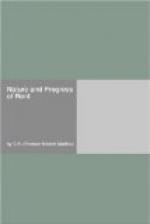I believe it to be the prevailing opinion, that the greatest expense of growing corn in this country is almost exclusively owing to the weight of taxation. Of the tendency of many of our taxes to increase the expenses of cultivation and the price of corn, I feel no doubt; but the reader will see from the course of argument pursued in this inquiry, that I think a part of this price, and perhaps no inconsiderable part, arises from a cause which lies deeper, and is in fact the necessary result of the great superiority of our wealth and population, compared with the quality of our natural soil and the extent of our territory.
This is a cause which can only be essentially mitigated by the habitual importation of foreign corn, and a diminished cultivation of it at home. The policy of such a system has been discussed in another place; but, of course, every relief from taxation must tend, under any system, to make the price of corn less high, and importation less necessary.
In the progress of a country towards a high state of improvement, the positive wealth of the landlord ought, upon the principles which have been laid down, gradually to increase; although his relative condition and influence in society will probably rather diminish, owing to the increasing number and wealth of those who live upon a still more important surplus(18) - the profits of stock.
The progressive fall, with few exceptions, in the value of the precious metals throughout Europe; the still greater fall, which has occurred in the richest countries, together with the increase of produce which has been obtained from the soil, must all conduce to make the landlord expect an increase of rents on the renewal of his leases. But, in reletting his farms, he is liable to fall into two errors, which are almost equally prejudicial to his own interests, and to those of his country.
In the first place, he may be induced, by the immediate prospect of an exorbitant rent, offered by farmers bidding against each other, to let his land to a tenant without sufficient capital to cultivate it in the best way, and make the necessary improvements upon it. This is undoubtedly a most short-sighted policy, the bad effects of which have been strongly noticed by the most intelligent land surveyors in the evidence lately brought before Parliament; and have been particularly remarkable in Ireland, where the imprudence of the landlords in this respect, combined, perhaps, with some real difficulty of finding substantial tenants, has aggravated the discontents of the country, and thrown the most serious obstacles in the way of an improved system of cultivation. The consequence of this error is the certain loss of all that future source of rent to the landlord, and wealth to the country, which arises from increase of produce.




